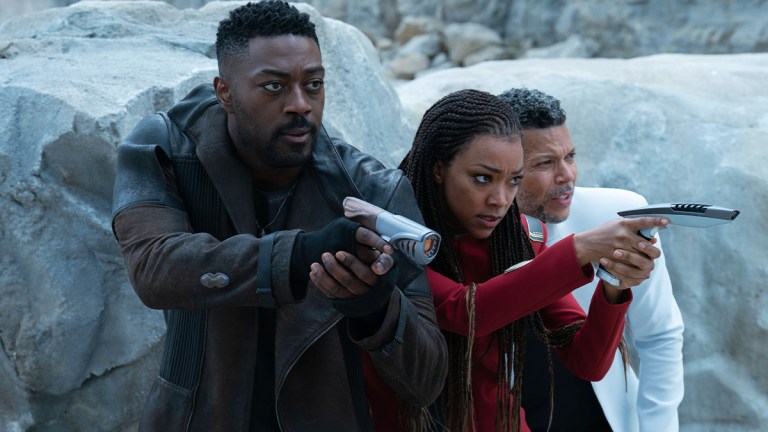The Final Days of Star Trek Discovery: What to Expect From Season 5 and Beyond
Exclusive: Star Trek: Discovery showrunners Alex Kurtzman and Michelle Paradise tell us what fans should expect from the show's final season and what's next for the franchise.

When producer Alex Kurtzman launched Star Trek: Discovery nearly a decade ago, the idea of bringing the Star Trek franchise back to TV was a gamble. Back in 2015, the most popular science fiction TV series were either on the SyFy Channel or Doctor Who. After having gone out with a whimper with Enterprise in 2005, could Trek rematerialize as a fully rejuvenated version of itself? Could a mainstream audience be enticed back to the final frontier by yet another new crew? At first, the answer was maybe.
After several delays, Star Trek: Discovery debuted in 2017 on a newly minted streaming service, CBS All-Access, and the reviews were mixed. After the departure of Bryan Fuller, some critics felt DISCO’s first season had a patchwork quality, amounting to a Trek tapestry that was as challenging as it was audacious. To say Discovery’s early years were some of the riskiest in Trek history is something of an understatement.
“We were the great experimenters,” executive producer Alex Kurtzman recalls while talking to Den of Geek magazine. “Discovery was the first in the door. It allowed us to understand what works well in modern Trek and what works less well. But it all started with DISCO.”
Because Discovery was the progenitor of all the new Star Trek that has followed, its scope and influence are bigger than most Trek series. Although it began as yet another prequel to the 23rd century of The Original Series, by the end of its second season, Discovery jumped to the 32nd century, making it the only Trek iteration ever that is a prequel and a sequel simultaneously.
“I’ve never thought about it that way!” Discovery showrunner Michelle Paradise says with a laugh. “But, without putting those words on it specifically, that’s always on our minds. We’ve always made sure that even as we move forward into the sequel piece of it all, we’re creating stories and continuing to develop characters that will feel satisfying—and that feel like they honor every piece of the franchise. But it’s a lot of franchise.”
As Discovery spore-jumps into its fifth and final season, several pieces of the Star Trek franchise will be honored at the same time, making this part of the franchise feel bigger than ever but also, strangely, smaller and more human than ever.
Discovery’s New Mission: Phasers on Fun
As Jonathan Frakes teased in 2023, Discovery’s final season has a flair borrowed from Indiana Jones, lending season 5 a treasure-hunt structure. And, when fans find out the origin of this particular treasure hunt, let’s just say you may be rewatching some older Star Trek episodes for a tiny bit of context. Discovery season 5 doesn’t need viewers to have seen every previous episode of other parts of the franchise, but right from the start of this new season, fans who remember the older iterations of the franchise will be rewarded.
“That aspect was very intentional,” Paradise says, teasing the deep-cut canon connections that propel Discovery’s new season. “When we made the jump into the future, it was really important to us that even as we played in the fresh snow, and we could do whatever we wanted, we always wanted to make sure that we anchored Discovery in the canon. So every season, we’re looking for ways to do that.”
And yet, despite its very slick connections to the larger Star Trek canon, Discovery season 5 is a much lighter, more upbeat collection of episodes than any of its four previous seasons combined. “That was very intentional. We very much recognized that with season four, there was a weight to it,” Paradise explains. “And so, coming into this season, Alex and I said we should have some fun. We want to have a sense of adventure. We didn’t lose the emotional heart of the show; the relationships between the characters and each of those characters grew individually. But yes, we wanted to have fun along the way.”
Journey’s End
Although Discovery season 5 will end the series, it’s no secret that it wasn’t entirely planned as the true ending. But, what’s strange is that as fans watch the first few episodes, there’s a sense with all the characters—from Saru (Doug Jones) to Stamets (Anthony Rapp) to Tilly (Mary Wiseman)—that the crew is all thinking about moving on to new challenges. In what has become Discovery’s hallmark, the roles of these Starfleet folks are not static, and just as Discovery switched captains for its first two seasons, other roles in the crew will be reshuffled and remixed in surprising ways this season.
There’s even room for a new Starfleet ally: the irascible and unpredictable Captain Rayner, played by Battlestar Galactica veteran Callum Keith Rennie. Sonequa Martin-Green describes working with Rennie as “brilliant,” while Paradise says his work in season 5 is “phenomenal.” And, as fans will see, his unexpected role creates a new interpretation of Starfleet that has never been glimpsed.
Still, despite the addition of Rayner and mysterious smugglers Moll (Eve Harlow) and L’ak (Elias Toufexis), season 5 is still about the found family of the Discovery crew and how their story comes to a close.
Will Discovery find a way to tie up a few loose threads before the end? In the 2018 Short Treks episode “Calypso,” in a future even more distant than the 32nd century, the benevolent AI Zora is the only person left on the ship. Will Discovery find its way to this plot point, or is that better thought of as a kind of What If…? for the Star Trek franchise? Paradise won’t spoil the ending just yet. “You’ll have to tune in and find out.”
The Continuing Mission
In 2024, as Discovery winds down, Trekkies will have a buffet of different kinds of series, each with a different audience in mind. But will those adventures continue in the 32nd century? We know the in-production Starfleet Academy is set during the 32nd century, but what about Michelle Yeoh’s Section 31 movie?
Kurtzman won’t commit to revealing too many details about the future of the timeline but does say, “I think you can expect more of [Discovery’s] 32nd Century. I won’t tell you how or, where, or why. But yes, that era is not over. As for Section 31, the version of Section 31 that we saw Georgiou be a part of on Discovery is very different from the version you will see in the movie. We’re not just repeating the thing that we did already.”
Kurtzman also hasn’t commented on the latest rumors of an “origin” feature film connected to the J.J. Abrams universe and only notes that whatever the project is, “they’ll have to honor all the canon we’ve created since Discovery.” He also admits that questions about greenlighting new Star Trek shows, like the much-discussed Star Trek: Legacy—a hypothetical sequel series to Picard—is also, as of writing, out of his hands. “If I had a magic button, a magic ‘greenlight button,’ for Star Trek: Legacy, and it was all on me, I’d push that button today,” Kurtzman says firmly. “Right now, it’s beyond my paygrade.”
And yet, magic greenlight buttons aside, it seems that pleasing everyone was never the mission of Discovery or the reborn Star Trek franchise in general. “Picard is not for everybody. Discovery is not for everybody,” Kurtzman says, emphasizing that he’s not interested in making Star Trek on a scale like Marvel.
“There’s still a homemade and handmade mom-and-pop shop quality to what we’re doing,” Kurtzman said. “One thing I’m certain of is that Star Trek has to deliver what is entirely familiar and entirely fresh at the same time. Discovery season 1, I think, tested that with fans. But I think you have to have an essential vision of optimism. I think that’s the core tenant of Roddenberry’s vision, and I think as long as you’re organizing your story around optimism and making sure your story is reinforcing that idea, then that’s Star Trek.”
Star Trek: Discovery season 5 hits Paramount+ on April 4.
